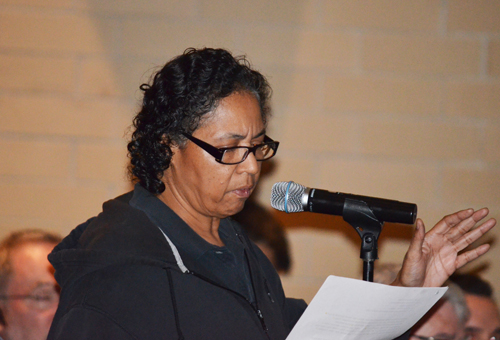BOARDWATCH: Speaker notes the risks created by Board's cutbacks in nurses
[Editor's Note: Once again, Substance's BOARDWATCH feature is publishing the remarks prepared and delivered by the speakers at the monthly meeting of the Chicago Board of Education. The meeting of November 19, 2014 may have been the largest turnout at a Board meeting in Chicago history. The meeting was held in the auditorium at Westinghouse High School, with 60 people signed up to speak. More would have signed up but the Board censors the number as well as the speakers with which Board members disagree. The following material was prepared by Georgia Waller and provided to Substance by her. George N. Schmidt, Editor, Substance].
 Georgia Waller speaking to the November 19, 2014 meeting of the Chicago Board of Education about the health crisis (and dangers) facing the schools because the Board denies each school a nurse. Substance photo by Nate Goldbaum. I am here today with a concern that is on the minds of many parents, administrators and staff members. The subject of concern is the lack of adequate nursing staff and the medication policy of CPS. Many are not aware that unlicensed personnel can distribute medication to students. In Special Education this is truly alarming.
Georgia Waller speaking to the November 19, 2014 meeting of the Chicago Board of Education about the health crisis (and dangers) facing the schools because the Board denies each school a nurse. Substance photo by Nate Goldbaum. I am here today with a concern that is on the minds of many parents, administrators and staff members. The subject of concern is the lack of adequate nursing staff and the medication policy of CPS. Many are not aware that unlicensed personnel can distribute medication to students. In Special Education this is truly alarming.
In the Journal of School Health, most nurses have stated that most errors occur becuase of the practice of using unlicensed assistant personnel. Missed doses (79.7 percent) or incorrect doses are common. With the large numbers of students in need, this poses problems for unlicensed assistant personnel and nurses alike. In addition, nurses feel discomfort because there may be problems involving state nurse practice laws.
CPS at one time had over 300 nurses in the system. Now there are approximately 220. Many nurses service anywhere between two to five schools. This is not an adequate number to handle all of the students in Chicago Public Schools. Our nurses are in three tiers -- they deal the IEPs, 540 plans, and direct services to students.
Nurse in CPS encounter such issues as:
1. DIABETES
2. SEIZURES.
3. TUBE FEEDINGS
4. TRACHS
5. CANCER, AND 6. MEDICATION DISTRIBUTION
Studies have shown that 60 percent of children have their first allegic reaction within the school setting. In CPS, 66 EPI Pens were administered last year. One school with 686 students had 35 students with severe allergic reactions that required the use of EPI pens.
I am not aware of any institution that deals with health care where an individual has to wait for a nurse to travel across town to receive care. Why should our students?
Our students deserve the best care that we can provide. Factors such as violence, poverty and unknown diseases must cause us to recognize and correct this problem. We can wait for a crisis to occur. The only way to address this issue is to provide skilled nurses in each of our CPS schools.

